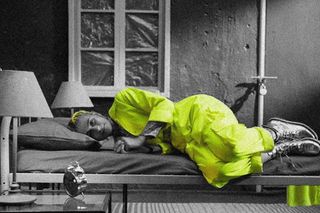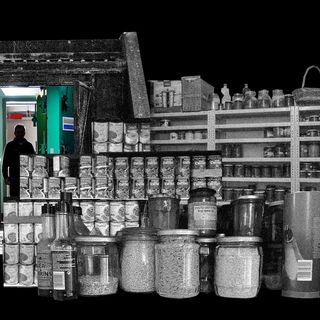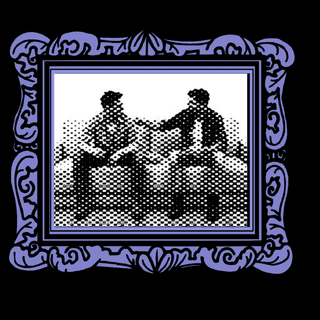
Madame Gandhi on Fourth Wave Feminism, Queer Commodification, and Tenderness in Music
“I don’t care if I lose half my followers, it better be the truth I’m speaking.”

Madame Gandhi, a Los Angeles-based Indian-American queer musician who shot a music video in India recently, describes her music as “electrofeminist,” a combination of spoken word, beats, and melodies that tackle issues such as menstrual equity and environmental racism. Once a drummer for M.I.A., then a viral sensation for having free-bled during the London marathon while on her period, and now a queer musician navigating the industry, Madame Gandhi sits down with The Swaddle to talk through the inspiration for her music, what artists need to do to sustain radical activism in their art and why the world needs more tenderness.
R: You’ve identified as a fourth-wave feminist in the past. What does that mean to you?
Madame: I see two main differences between the third and fourth wave of feminism. The first one is the shift to seeing the feminine as an opportunity for leadership. If you look at the world right now, there’s so much aggression in the way we handle anything, whether it’s President 45 in the American White House, whether it’s the fact that we’re protesting police brutality in the #BlackLivesMatter movement, and of course, we have Modi who is very aggressive in his politics. So, for me, the fourth wave of feminism is saying: what is it that feminine styles of leadership can really offer us that look a little different than the way we’ve been doing things? How might that be better?
I think feminine styles of leadership teach us that we should be more emotionally intelligent, teach us to prioritize collaboration instead of competition, and really seek to live in a world that is linked and not ranked, which is a thing I talk a lot about, from Gloria Steinem.
Related on The Swaddle:
It’s Time We Accept Those Questioning Their Sexuality, Gender as Unquestionably Queer
And the second aspect of this fourth wave is the social media component. Unlike any other generation in the past, we have been able to mobilize people from their phones and into the streets. There’s a lot of conversation about removing gender altogether because gender still has a hierarchy and the second we start valuing femininity just as much we value masculinity then it doesn’t matter which gender you identify with.
R: What about your music? You’ve talked about distancing yourself from labels, building a community on social media. Why that route?
Madame: Back to the social media complement — we do live in an era where I can just post on my own social without certain censorship. I think it’s really radical and really cool that we can post what we want to our social media and build our own audience, around our own music, our own ideas our own lyrics. Now, with Sony, there’s an opportunity to get my message out to more people. It’s so ironic because obviously a major label is the definition of the capitalist system, which says how do we take a piece of music and exploit it across as many different channels as possible?
But I think a healthy business can be done when parties feel respected and their expectations are met. My expectations as an artist would be: I have music, if I promote it on my own social, it only goes to so many people. If I have the support of a Sony, it goes to a lot more people and it’s a message that needs to be heard. That is one way I think I can make the message heard while working in a capitalist society.
R: What, according to you, does this capitalist music industry provide or not provide to those who want to voice radical politics?
Madame: I think people are just so afraid of losing money. Even in this day and age, people are like I don’t want to post this or that because I don’t want to lose followers. It’s the same mentality: it’s the label telling the artist, hey don’t post about whether you support this Trump candidate or that candidate because we don’t want you to lose followers because your followers come from all sides of the spectrum. But I disagree with that. We have to be honest; we have to tell the truth; we have to stand firm for what we believe in. And we have to realize that if we’re on the right side of history and of justice, artists have a lot of influential power, influencing people emotionally with our music, with our visuals, with our thought process, and may we use that power for good.
I don’t care if I lose half my followers, it better be the truth I’m speaking.
R: So, for artists who want to voice their politics, how do they sustain themselves in an industry that is still largely looking to censor radical thought?
Madame: I think the biggest thing as an artist or a creative professional is always for us to diversify our source of income. When I first graduated Harvard, I used to do consulting projects that had nothing to do with my music. Even though I didn’t enjoy making Powerpoints, I used to just hustle and do it. Teaching drum lessons, learning how to DJ. I think the past five years have had two parallel developments — one, constantly making sure I’m financially sustainable as an artist, and the second is developing the music, the voice, the visuals, the core messaging to the project. That does make you poised for other people to want to work with you because you’re a self-sustaining entity, you’re doing well on your own, and the things that are needed like advertising or expanding the project are very clearly things that a label can provide.
At the same time, I think the industry has expanded to allow more artists to simultaneously be successful. That’s why it feels more difficult but it’s also easier in a way. In the past, there was this engine that could help you in a way, but I think there were fewer spots. Either you were in the top 40 of the MTV rotation or the radio rotation, or you just weren’t heard. Now I open up my Instagram, and I end up on someone’s random page, they have a million followers and I had never heard of them in my life, which goes back to the power of the social media component.
R: But what about echo chambers on social media? How are you reaching people who don’t agree with your politics or your message?
Madame: I actually don’t know. I had been prioritizing this with my team. People who follow my work love my work; they agree with my politics. That’s why I don’t feel anything radical when I post because like.. duh. You’re so right, where are the folks who disagree? Getting into most mainstream channels, infiltrating spaces like Vh1, Vogue are some of the ways we can do it. I don’t know how to get past my initial follower base. Let’s check back in a year and maybe I’ll have an answer for you.
R: You’ve also been public about being queer and using that in your music as a means of self-expression. We’ve heard so much about pinkwashing, rainbow capitalism. How do you see brands treating young queer musicians?
Madame: I think most people see through when different big conglomerates are late to the game. I passed by a big label called Capitol Records here in Hollywood about a week ago. I pointed out to my friend, hey that’s cool they have a Black Lives Matter flag and a Pride flag, and my friend goes, that’s not cool, if they don’t put that they’ll be in trouble. It’s the opposite now. They’re not taking any risk. They’re just covering themselves. Where was that a year ago when it would have been like a risk?
Related on The Swaddle:
Corporate Investment in Pride Increases Visibility, Doesn’t Expand Rights
I think we, as people, we are not fools. The consumers are more educated now, because social media has opened up access to our own education. I think we trust brands less that are late to the game. You’re not fooling anybody, so I think the better brand or marketer should be having conversations about what’s happening next, how do we take risks, how do we genuinely show up?
How do I feel when brands approach me to be the queer poster person? I think a lot of times, and I mean this respectfully, they have a budget. At least they’re saying: hey, we are not hip to the activism, but at least we have money that can support you in this way. And I do think that’s legit because we live in a capitalist world where folks of color tend to have access to fewer opportunities because we’re not in the mainstream. I think brands coming in and supporting with their dollar or their rupee is a positive thing.
R: What about tokenism in your own music? Is there a line you draw in terms of how you include people in your music and videos, such as the latest “Waiting For Me” video that shows Indian people across the gender spectrum?
Madame: For “Waiting For Me,” we sat down and thought we wanted to have ten girls or gender non-conforming or trans people to be in the music video as the squad.
For me, tokenism looks like we have a quota to fill and we’re just checking boxes. I don’t have an issue with intentionally programming folks of diverse backgrounds because if we don’t make that conscious effort, all of those folks fall through the cracks. They’re not models from casting agencies, they’re people who look like us and get lost in the mix. We have to be intentional, but the way I eliminate tokenism is two-fold — do I like that person’s energy? Even if I check all the boxes and they don’t make me feel safe on my own set, or they don’t make me feel like they’re excited to be part of it, then it’s okay, it’s not the right project for us, even if all the boxes are checked. There has to be an emotional vibe. And second, most of these people are my friends.
Yes, we intentionally did program a diverse cast, and I actually love these people.
R: What are the reasons you see for people becoming more accepting of the kinds of issues you raise in your music? For someone like you being able to reach a mainstream audience?
Madame: I think once big capitalist forces decide they’re going to support something, it changes the overall narrative. Luckily there’s activist forces that push back saying ‘oh don’t act like you’ve been the first this has been going on for decades’ and eventually the consumer is more educated. It’s good to live in a time when being queer and being a person of color is relevant. I don’t know, let’s see next month. The pendulum always swings.
R: Speaking of trends, what would you like mainstream music to have more of? What is it lacking?
Madame: It’s so funny people think feminism is aggressive, kind of militant, and like fighting. Honestly, for me, it’s more tenderness, more sweetness, more care, more love. Those are things I’m missing in my life with quarantine. I wish there was more tenderness in the mainstream music industry. I wish there was more love.
That’s why I tend to gravitate toward queer female experiences, because there is a lot of tenderness between women that’s lacking between men and women. Of course, that’s not saying it’s not there — there are so many romantic love songs but usually, it’s from the perspective of the guy, he’s going ‘oh I’m so in love she’s the woman of my dreams I’m going to marry her,’ and that’s the end of the story basically. He’s the hero and he had to overcome something.
It’s not our perspectives, our stories, our pleasure our struggles, our tenderness. Where is that in the conversation? Where is that in the storytelling? So that’s why I try to make music videos that would make me feel good like whether it’s love in a friendship capacity or love in a romantic capacity. I think I’m trying to fill in the void of tenderness.
Rajvi Desai is The Swaddle's Culture Editor. After graduating from NYU as a Journalism and Politics major, she covered breaking news and politics in New York City, and dabbled in design and entertainment journalism. Back in the homeland, she's interested in tackling beauty, sports, politics and human rights in her gender-focused writing, while also co-managing The Swaddle Team's podcast, Respectfully Disagree.
Related


What Makes Doomsday Preppers Brace For The Apocalypse?
